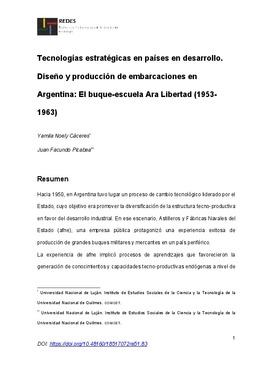Tecnologías estratégicas para países en desarrollo. Diseño y producción de embarcaciones en Argentina: el buque-escuela ARA Libertad (1953-1963)
Strategic technologies for developing countries. Design and production of vessels in Argentina: the training ship ARA Libertad (1953-1963)
Abstract
Hacia 1950, en Argentina tuvo lugar un proceso de cambio tecnológico liderado por el Estado, cuyo objetivo era promover la diversificación de la estructura tecno-productiva en favor del desarrollo industrial. En ese escenario, Astilleros y Fábricas Navales del Estado (AFNE), una empresa pública protagonizó una experiencia exitosa de producción de grandes buques militares y mercantes en un país periférico. La experiencia de AFNE implicó procesos de aprendizajes que favorecieron la
generación de conocimientos y capacidades tecno-productivas endógenas a nivel de la empresa, del sector y del ámbito político. El análisis del artefacto, ARA Libertad, posibilitó observar a nivel micro las negociaciones de sentido y estrategias de acción de los grupos sociales intervinientes, vinculados al nivel macro del modelo de acumulación. Around 1950, a state-led process of technological change took place in Argentina, the objective of which was to promote the diversification of the technological and productive structure in favor of industrial development. In this context, Astilleros y Fábricas Navales del Estado (AFNE), a public company, was instrumental in a successful production of large military and merchant vessels in a peripheral country. AFNE's experience involved learning processes that favored the generation of endogenous technological and productive knowledge and capabilities at the company, sector, and political levels. Analysis of the ARA Libertad artifact made it possible to observe, at the micro level, the negotiations of meaning and action strategies of the intervening social groups, linked to the macro level of the accumulation model.

